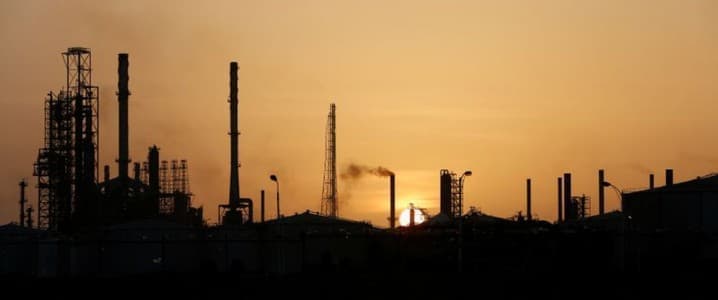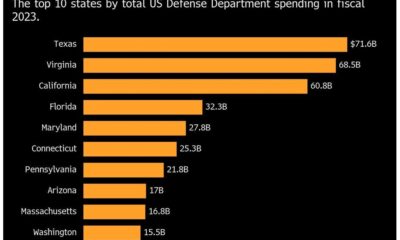Business
US-Venezuela Tensions Escalate, Impacting Global Energy Markets

The ongoing tensions between the United States and Venezuela have intensified, raising significant concerns for global energy markets. Recently, American warships resumed patrols in the Caribbean, coinciding with Venezuelan fighter jets flying in the same airspace. On September 2, a vessel reportedly linked to drug smuggling was destroyed by the US military, although this claim is under dispute. These developments reflect a broader deterioration in US-Venezuela relations, marked by fluctuating policies regarding energy and security.
Over the past two years, the situation has shifted dramatically, from the revocation of Chevron’s operating license to its partial renewal, culminating in military escalations. Central to this conflict is the narrative surrounding the so-called ‘Cartel de los Soles,’ which the previous Trump administration alleged was directed by Venezuelan President Nicolas Maduro. The US State Department has cited this narrative as justification for its confrontational stance towards Venezuela, despite the lack of substantial evidence supporting the existence of such a criminal organization.
A recent report by the digital media outlet Guacamaya, titled ‘The Cartel de los Soles: How a Narrative is Used to Push for Regime Change,’ critically examines these claims. The report concludes that there is insufficient proof of the ‘Cartel de los Soles’ as a cohesive entity and suggests that the term has been broadened over time to portray Venezuela as a ‘narco-state.’
Competing Interests in Energy
This narrative is closely associated with Marco Rubio, the US Secretary of State and National Security Adviser, who has been instrumental in promoting the ‘Cartel de los Soles’ theory as part of a broader policy framework towards Venezuela. His influence has ensured that this issue remains prevalent in Washington, even as Chevron continues its operations in Venezuela, supplying heavy crude to refineries along the Gulf Coast.
The contradiction within US policy is glaring. While military deployments and sanctions heighten tensions, American energy interests still depend heavily on Venezuelan oil production. Venezuela is home to the world’s largest proven oil reserves, estimated at approximately 303 billion barrels. In 2024, Venezuelan oil accounted for 13% of imports to Gulf Coast refineries. Following the suspension of Chevron’s license on May 27, 2025, Gulf Coast refiners were forced to seek alternatives, purchasing larger quantities of crude from the Middle East and South America. Any further disruption to Venezuelan oil supplies poses a significant threat to US energy security and could lead to increased gasoline and diesel prices for consumers.
The narrative surrounding the ‘Cartel de los Soles’ further complicates regional energy disputes. For instance, ExxonMobil has substantial investments in Guyana’s Stabroek block, which contains an estimated 11 billion barrels of reserves in waters that Venezuela claims. Improved relations with Caracas could open the door for territorial negotiations, potentially jeopardizing ExxonMobil’s interests in the region.
Seeking Pragmatic Solutions
In light of these complexities, a more pragmatic approach may better serve US interests. By focusing resources on the actual hubs of the regional drug trade, particularly Mexico and Colombia, and adhering to international commitments to counter drug trafficking, the US could create a more balanced policy. Engaging with Venezuela to secure energy supplies while addressing security concerns may offer a pathway to stabilize both the geopolitical landscape and energy markets.
As the situation evolves, it is evident that navigating these intricate dynamics will require a shift towards realistic policies that prioritize both energy security and regional stability.
-

 World3 months ago
World3 months agoScientists Unearth Ancient Antarctic Ice to Unlock Climate Secrets
-

 Entertainment3 months ago
Entertainment3 months agoTrump and McCormick to Announce $70 Billion Energy Investments
-

 Lifestyle3 months ago
Lifestyle3 months agoTransLink Launches Food Truck Program to Boost Revenue in Vancouver
-

 Science3 months ago
Science3 months agoFour Astronauts Return to Earth After International Space Station Mission
-

 Technology2 months ago
Technology2 months agoApple Notes Enhances Functionality with Markdown Support in macOS 26
-

 Top Stories2 weeks ago
Top Stories2 weeks agoUrgent Update: Fatal Crash on Highway 99 Claims Life of Pitt Meadows Man
-

 Sports3 months ago
Sports3 months agoSearch Underway for Missing Hunter Amid Hokkaido Bear Emergency
-

 Politics3 months ago
Politics3 months agoUkrainian Tennis Star Elina Svitolina Faces Death Threats Online
-

 Technology3 months ago
Technology3 months agoFrosthaven Launches Early Access on July 31, 2025
-

 Politics3 months ago
Politics3 months agoCarney Engages First Nations Leaders at Development Law Summit
-

 Entertainment3 months ago
Entertainment3 months agoCalgary Theatre Troupe Revives Magic at Winnipeg Fringe Festival
-

 Politics2 weeks ago
Politics2 weeks agoShutdown Reflects Democratic Struggles Amid Economic Concerns




















